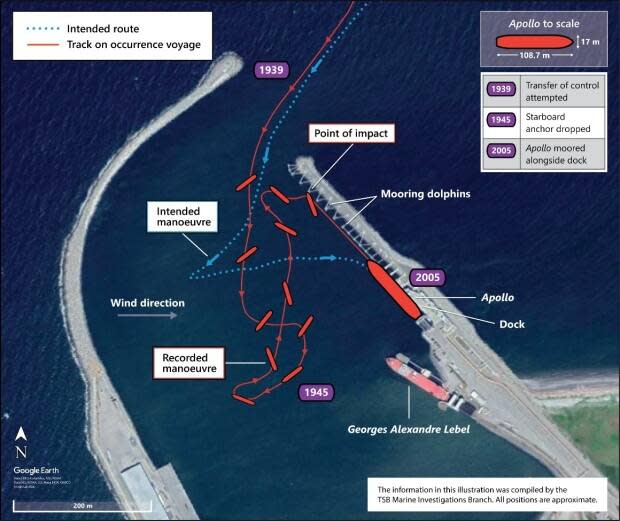Quebec's ferry service knowingly kept deteriorating boat in operation, TSB says

Quebec's provincial ferry agency knew it was dealing with a broken-down boat that wasn't seaworthy but put it into service anyway, an investigation by the Transportation Safety Board of Canada (TSB) has found.
The NM Apollo, which was supposed to ferry traffic across the St. Lawrence River from Matane to Baie Comeau and Godbout, had to be grounded in 2019, just weeks after it was hastily purchased to replace a nearly new, problem-plagued ferry, the F.A.-Gauthier.
The Société des traversiers du Québec (STQ) was forced to retire the 49-year-old NM Apollo after the ferry smashed into docks twice over its short-lived run.
In a report published Wednesday, the TSB revealed the ferry service had failed to carry out a pre-sale inspection when it bought the NM Apollo at a cost of $2.1 million, and later discovered its many faults.
"The STQ initially postponed the Apollo's entry into service and began conducting repairs. However, under pressure to restore the ferry service and considering that the Apollo was a temporary vessel for short-term use, the STQ put the vessel into service while repairs were ongoing," read the report.
The STQ was in such a rush to get ferry crossings going again, it also didn't conduct a risk assessment, the investigation found.
The TSB's extensive inspection of the deteriorating boat revealed broken and exposed electrical wiring, watertight compartments that leaked, flooding and widespread rust and other leaks. The ferry's poor condition also contravened fire safety standards.

Provincial officials were not the only ones who failed to report the ferry's numerous flaws, the investigation found. Transport Canada (TC) inspected the vessel before it went into service, but it didn't flag any concerns that the vessel was dangerous or not seaworthy, providing it with the certification it needed to make the crossing.
"These inspections did not identify a number of unsafe conditions present on the vessel and resulted in the recognized organization issuing the Apollo the certificates it required for entry into service," the report reads.
"If oversight of delegated vessels by TC and recognized organizations does not lead to the identification and timely resolution of unsafe conditions and regulatory contraventions, there is a risk to the safety of the vessel, its crew, its passengers, and the environment."
The TSB declared the ship to be potentially unseaworthy after an inspection following its second collision into the Matane dock, on March 17, 2019.
At the time, inspectors with the provincial ferry service discovered broken electrical wiring led to the ship's bow thruster not functioning, which ultimately led to the crash.

Lack of risk assessments across marine industry
The fact that the ferry's woeful condition slipped through the cracks despite numerous inspections over its lifetime by Transport Canada led Line Laroche, the TSB's lead investigator, to express concern there could be more unseaworthy ferries in operation elsewhere in the country.
Clifford Harvey, the TSB's director of marine investigations, said it is difficult to pinpoint what could have been done to prevent the NM Apollo's crashes, but added that "regulatory surveillance" has been identified as an overall issue with marine transportation.
The board's latest watchlist report, released in 2020, includes a recommendation that Transport Canada "take steps to ensure that small passenger vessel enterprises have a safety management system."
In a statement, the provincial ferry service pointed to numerous changes adopted since its internal investigation into the NM Apollo in 2019 — changes the TSB confirmed had been adopted.
"It is certain that this file has made our organization grow, and the lessons learned are now part of the culture of the STQ," said Bruno Verreault, the STQ spokesperson.
Those lessons include workshops about safety and fatigue management, the hiring of directors responsible for continual risk assessment on each of the province's ferry crossings and a requirement that all vessels be inspected before they are purchased.

 Yahoo Movies
Yahoo Movies 
